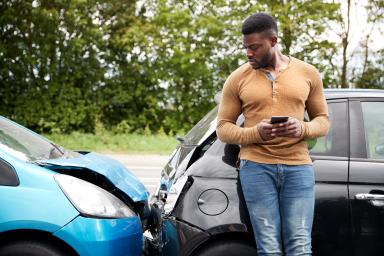Florida Car Accident Laws

Despite being a cautious and safe driver, there’s a chance you’ll be involved in an accident at some point or another, even if it’s not your fault.
According to the Department of Highway Safety and Motor Vehicles (FLHSMV), there were over 388,000 crashes in Florida in 2022, 3,400 fatal crashes, and over 247,000 injuries from accidents.
Understanding Florida car accident laws can help you protect your rights and get the compensation you deserve after an accident. Here’s everything you need to know about what to do after a car accident in Florida, how comparative negligence works in the state, and Florida’s minimum auto insurance requirements.
Florida Car Accident Reporting Requirements
Drivers involved in a collision must report it to the local police if it caused at least $500 in property damage or resulted in injury or death. If the accident did not occur in a municipality, drivers must instead report the incident to the Florida Highway Patrol or the nearest office of the county sheriff.
If a crash does not meet these requirements, drivers can complete a “Driver Exchange of Information” or “Driver Report of Traffic Crash (Self Report)” form — both of which can be found on the FLHSMV website.
Reporting an accident to the police can also help support your case in the future if you attempt to recover compensation from another driver after an accident.
Fault in Florida Car Accidents
Florida is a no-fault car insurance state, meaning drivers file claims with their own insurance companies. Their personal injury protection (PIP) benefits pay up to $10,000 of their medical treatment after a car accident. Your PIP benefits are primary regardless of fault. PIP benefits are often referred to as No-Fault Benefits.
If you sustain minor injuries after a collision, you must file a personal injury protection (PIP) claim, which can pay for 80% of reasonable medical expenses, 60% of lost income (if work loss is not excluded), and $5,000 in death benefits. You must also seek treatment within 14-days from the date of the car accident, otherwise you will forfeit these benefits.
Exceptions to No-Fault Insurance in Florida
While Florida is a no-fault state, there are several exceptions to this. According to Florida law, victims of a car accident may be able to bring a claim against an at-fault driver if the accident resulted in the following:
Permanent and significant loss of a necessary bodily function
Permanent injury
Permanent scarring or disfigurement
Death
In these situations, the victim may be able to receive compensation for medical bills, pain and suffering, and lost wages.
You may also be able to seek compensation from an at-fault driver if you sustain more than $10,000 in damages and your PIP coverage does not fully cover these expenses.
A Florida car accident attorney can help you determine whether or not your situation qualifies for exceptions to the state’s no-fault insurance system.
Modified Comparative Negligence in Florida
In March 2023, Governor Ron DeSantis signed into law the House Bill (HB) 837, changing Florida from a pure comparative negligence state to a modified comparative negligence state. Florida’s modified comparative negligence rule applies when both drivers involved in an accident are responsible for the collision.
A car accident victim can still sue for damages, but the award will be adjusted by an amount that corresponds to their share of the blame. In these cases, the jury will be asked to calculate the plaintiff’s total damages and the percentage of fault that belongs to each party. If the jury finds that the car accident victim is more than 50% at-fault for their injuries, they will be barred from recovery.
Responsible parties may not be able to recover any settlement
For example, if the jury decides that your total damages amount to $80,000 and that you’re 40% responsible for the accident, your award would be reduced to $48,000. But if they find you’re 51% or more responsible for the accident you will not be able to recover any settlement.
Since Florida follows a modified comparative negligence approach to car accidents, victims can still receive compensation for damages as long as they are not found to be more than 50% at fault.
Sometimes liability can be questionable or the investigating police officer cannot determine fault based on the stories of the parties. It’s important to preserve all evidence to avoid liability issues.
Real Life Examples: The Importance of Witness Statements and Video Footage
Attorney Lauren Weber is a personal injury lawyer in New Port Richey, Florida. She frequently overcomes these liability hurdles by securing statements from witnesses as well as video footage from nearby businesses or houses.
In one particular case, an insurance company was denying liability for an accident and alleged Attorney Weber’s client ran a red light. Attorney Weber was able to secure video footage from a local medical maraijuana dispensary and prove her client had the green light. The insurance company reversed their decision and paid out their policy limits. It’s important to preserve this kind of information before it is lost or destroyed.
Requesting Insurance Information
Section 324.242(2), Florida Statutes, states that insurance information for a vehicle involved in an accident can only be released to:
Drivers involved in the crash
The attorneys of the parties involved in the accident
Representatives of the insurers of anyone involved in the crash
An experienced attorney will investigate and determine all applicable policies that may afford coverage for your accident. If you did not obtain the other party’s insurance information at the scene, you can request the other party’s insurance coverage by completing thefollowing:
To obtain the insurance information of the other party involved in an accident, you must do the following:
Complete the Insurance Request Form (HSMV 83392)
Request a copy of the complete crash report, including the front and back. You can purchase a crash report at floridacrashportal.gov.
Mail or fax the Insurance Request Form along with the crash report to:
a. Customer Service Correspondence Center
2900 Apalachee Parkway, Room A216, MS 99
Tallahassee, Florida 32399-0585
Fax: 850-617-5216
It may take up to 10 days for processing after the FLHSMV receives this information.
Unlawful Speed
Understanding Florida’s laws regarding unlawful speed can help drivers understand who may be at fault for an accident.
The law states that drivers should never drive a vehicle on a highway at speed greater than is reasonable under current conditions. Drivers should control their speed to avoid colliding with any person, vehicle, or object.
School buses must never exceed the posted speed limits at any time, and drivers of any vehicle should drive at an appropriately reduced speed when:
Approaching a hill
Crossing or approaching an intersection or railroad crossing
Approaching or going around a curve
Driving on narrow roadways
Driving on winding roads
Any special hazards are currently present, including weather-related hazards
Drivers also must not drive at such a slow speed that they obstruct the normal movement of traffic, and drivers must always stay within the posted speed limit in a work zone.
Florida Safety Belt Law
It is unlawful for any person in Florida to operate a motor vehicle unless the driver and each person who is under 18 is wearing a seatbelt.
Any person that is 18 or older must also be wearing a seat belt if they are sitting in the front seat of a motor vehicle.
There are a few exceptions to this rule. The following people are not required to be restrained by a seatbelt while in a motor vehicle:
Individuals with a medical condition that causes the use of a safety belt to be inappropriate or dangerous.
Solid waste or recyclable collection service employees while conducting their regular job duties.
Home newspaper delivery service employees that are currently delivering newspapers on home delivery routes.
Rural letter carriers for the USPS.
Violating this law may result in a nonmoving violation and may be considered evidence of comparative negligence in any civil action. If the jury finds that you are more than 50% responsible for your injuries because you were not wearing a seatbelt, you will be barred from recovery.
Child Restraint Requirements
Drivers must use a crash-tested, federally approved child restraint device if driving with a child who is five years of age or younger.
The restraint device must be a separate carrier or a vehicle manufacturer's integrated child seat for children under three years of age.
For children aged four to five years old, the restraint device must be a separate carrier, an integrated child seat, or a child booster seat. This is not required if the child is being transported as a favor by someone who is not an immediate family member as long as the child uses a seatbelt. There are also exceptions for children being transported in an emergency and for children who have medical conditions that make using a child restraint dangerous.
Violations of Child-Restraint Requirements Cannot Be Considered Comparative Negligence
However, unlike violating the Florida Safety Belt Law, violations of child restraint requirements cannot be considered comparative negligence, nor used as evidence in the trial of any civil action.
The National Highway Traffic Safety Administration (NHTSA) recommends replacing a child car seat after any moderate to severe car accident.
In terms of damage severity, CARFAX defines a moderate damage as “[m]oderate damage may affect multiple components of the vehicle and may impair the vehicle’s operation and/or safety,” and severe damage as severe damage as “[s]evere damage usually affects multiple components of the vehicle and is likely to compromise the vehicle’s operation and/or safety.”
After a moderate car accident, the damage may be extensive, but you can usually repair the vehicle. On the other hand, a severe car accident typically causes significant damage. The vehicle is rendered inoperable and necessitating towing from the scene. Even if your child is not in the car seat during the car accident, its integrity has been compromised and should be replaced.
Florida Auto Insurance Requirements
Florida drivers are required to have a minimum amount of auto insurance coverage to operate a motor vehicle legally.
Unlike most states, Florida does not require you to have bodily injury liability coverage, which covers losses related to injuries after a car accident. Instead, the state requires drivers to have a minimum of:
$10,000 in PIP coverage
$10,000 in property damage liability (PDL) coverage
PIP coverage pays for your own injury-related losses after a traffic accident, regardless of who was at fault.
PDL coverage pays for any property damage you cause to another party’s property after causing an accident.
Compared to other states, Florida’s auto insurance requirements are minimal, making it important for drivers to consider purchasing additional coverage to ensure they are prepared for the possibility of an accident.
This may include:
Bodily injury liability insurance
Collision coverage
Comprehensive coverage
Gap coverage
Roadside assistance
Uninsured/underinsured motorist coverage
Rental reimbursement coverage
According to the FLHSMV, any vehicle with a current Florida registration must also:
Be insured at the time of vehicle registration.
Have continuous coverage even if the vehicle is inoperable (drivers must surrender their license plates before canceling their insurance policies).
Maintain Florida insurance coverage continuously throughout the registration period, regardless of the vehicle’s current location.
To comply with Florida state law, insurance policies must be purchased from an insurance carrier licensed to do business in Florida. New residents may ask their agents to transfer their current insurance to a Florida policy.
If you fail to maintain minimum insurance coverage in Florida, your driver’s license and registration may be suspended, and you may have to pay a reinstatement fee of up to $500.
How Much Can Someone Sue for a Car Accident in Florida?
There are no set limits for how much you can sue someone for after a car accident in Florida.
Since Florida is a no-fault state, drivers cannot sue another driver after a car accident if they did not sustain a permanent injury.
If the circumstances surrounding your accident qualify for an exception to the no-fault insurance system, you may be able to sue for the following:
Medical bills (past and future)
Lost wages
Future earnings
Pain and suffering
To determine your total award, the jury will consider the total cost of current and future medical costs related to damages sustained in the accident, all wages and benefits that you lost due to the accident, future wages lost if you are unable to return to work, and the severity of your injuries.
The court will also consider damages related to pain and suffering. Pain and suffering is evaluated on a case-by-case basis and is largely dependent on how the car accident has impacted your life, including its impact on your mental health, quality of life, and emotional well-being.
Since Florida follows a modified comparative negligence rule, your award will be adjusted if you are found to be partially responsible for the accident. If you are found to be more than 50% at fault, your recovery will be barred.
The Statute of Limitations in Florida
Each state has its own statute of limitations (SOL) for personal injury lawsuits. The statute of limitations establishes how long a person has the right to sue another driver after a car accident.
In March 2023, Governor Ron DeSantis signed into law the House Bill (HB) 837, which significantly impacted the personal injury statute of limitations in Florida.The SOL varies based on when your accident occurred:
If your accident happened BEFORE 03/24/2023 and your injuries did NOT result in death, the SOL for an injury claim is 4-years from the date of the accident.
If your accident happened AFTER 03/24/2023 the SOL for an injury claim is 2-years from the date of accident.
In Florida, the statute of limitations allows victims of car accidents to file a lawsuit within the applicable time period. If this deadline passes, but you still try to file an auto accident lawsuit, the court will almost certainly dismiss the case.
While 2 years may seem like plenty of time to pursue your case, you should be careful not to delay filing a lawsuit if you believe you are entitled to damages. Your attorney will need plenty of time to resolve your case via a settlement with the insurance company before filing a lawsuit. By waiting longer to pursue damages, it will also be more challenging to prove that your damages or injuries are related to the accident, making it more difficult to get the compensation you deserve.
If a car accident results in death and the deceased party’s family wants to file a wrongful death lawsuit, they must do so within two years of the date of the accident.
Is Florida a no-fault state?
Yes, Florida is a no-fault state. This means drivers must file a PIP claim with their insurance companies to receive compensation for minor injuries. There are several exceptions to this rule, though, allowing drivers to file lawsuits for damages like medical bills, lost wages, and pain and suffering.
Legal Resources for Florida Car Accident Victims
If you’ve been in a car accident in Florida, there are several online resources available to help you understand what steps to take next, file any necessary forms, and get legal assistance to pursue your case.
However, it is recommended you contact an experienced car accident attorney to protect your rights and help you maximize your recovery.
Here are a few helpful legal resources for Florida car accident victims.
Department of Highway Safety and Motor Vehicles
The Department of Highway Safety and Motor Vehicles provides highway safety and security through enforcement, education, and service.
On the FLHSMV website, drivers can find information regarding auto insurance requirements, what to do after an accident, and common forms they may need to file in different situations.
Drivers can also visit this website to learn how to renew or replace their registration, view live accident and road condition reports, and learn how to renew their driver’s licenses.
Visit: flhsmv.gov
Florida Highway Patrol
The Florida Highway Patrol (FHP) ensures the safety and welfare of drivers in Florida. If you are in an accident, you may contact the Florida Highway Patrol for help, and in some cases, reporting an accident to the FHP is required.
If you are in an accident or witness an accident, you should call 911, and you can dial 347 to contact the FHP.
You can also visit the FLHSMV website to find out how to contact the FHP for other concerns, including filing a complaint, complimenting a trooper, or completing a citizen survey.
Visit: flhsmv.gov/florida-highway-patrol/about-fhp/
Florida Department of Transportation
The Florida Department of Transportation (FDOT) regulates all traffic on Florida roads and highways.
The agency’s website provides access to several great resources for drivers and car accident victims, including travel advisories, road conditions, information about traffic laws in Florida, and crash data.
Visit: fdot.gov
Expertise.com StaffAuthor
Step into the world of Expertise.com, your go-to hub for credible insights. We don't take accuracy lightly around here. Our squad of expert reviewers, each a maestro in their field, has given the green light to every single article you'll find. From rigorous fact-checking to meticulous evaluations of service providers, we've got it all covered. So feel free to dive in and explore. The information you'll uncover has been stamped with the seal of approval by our top-notch experts.

Attorney Lauren WeberReviewer
Lauren N. Weber is a dedicated and experienced car accident lawyer, advocating for justice and compensation for her clients. She has a passion for serving the community through her personal injury law practice at Weber Law Firm.

![Airbag Injuries and Average Settlement Amounts [2023]](https://images.ctfassets.net/k00sbju4hbzq/3BBaoZsvlj0NDySlMekb5V/aae10f65f969b6faf29ccfbee387c4d4/Depositphotos_61460709_XL.jpg?fit=fill&w=384&q=75)
![Average Car Accident Settlements [2023]](https://images.ctfassets.net/k00sbju4hbzq/4BBkDDWAQT0dL8I9OSMFnt/36439fec4b6260a58e0c384f64809566/Depositphotos_335949804_XL.jpg?fit=fill&w=384&q=75)
![Can I File a Lawsuit if the Car Accident Was My Fault? [2023] DUP IMAGE](https://images.ctfassets.net/k00sbju4hbzq/KjM0u9gm0nmPN9Agv7fih/5a7d1f7c763eada5c66e5547e6e487e1/Depositphotos_341258876_XL.jpg?fit=fill&w=384&q=75)
